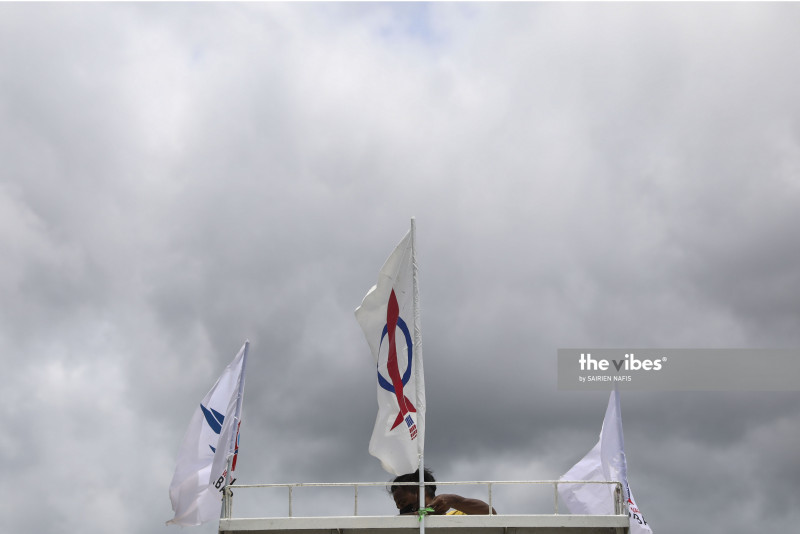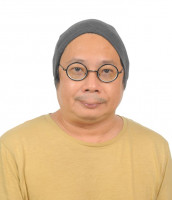theVibes.com:
Indian leadership vacuum in DAP
Veteran party member says prima donnas, ‘parachuters’ won’t resolve community’s issues.
Updated 9 hours ago · Published on 15 Sep 2024 7:00AM

DAP grassroots leaders point out growing dissatisfaction over the lack of Indian representation in the national unity government. – The Vibes file pic, September 14, 2024.

by Ian McIntyre

by Ian McIntyre
PENANG executive councillor Datuk S. Sundarajoo has declined his nomination to contest in the upcoming state DAP party election next Sunday, raising concerns about representation from the Indian community in the party’s top leadership.
Sundarajoo, a former technocrat, expressed his honour at being nominated but cited other commitments as the reason for declining to run. His exit leaves 31 candidates competing for 15 committee posts, with leading contenders from Penang including Human Resources Minister Steven Sim and Deputy Finance Minister Lim Hui Ying.
Sundarajoo's decision not to contest has reportedly deepened a growing sense of disillusionment among Indian delegates regarding the national party polls.
A veteran DAP leader, speaking anonymously, said, “Bringing in prima donnas or parachuters into the party won’t resolve the community’s issues. Leaders must genuinely want to help the community.”
This comes after former deputy chief minister P. Ramasamy’s acrimonious departure from DAP, which led him to form alternative party Urimai, which means "rights" in Tamil. Ramasamy has since filed a defamation suit against Penang Chief Minister Chow Kon Yeow. Additionally, former Perak DAP deputy chairman V. Sivakumar was replaced as Human Resources Minister by Sim, and DAP national vice-president M. Kulasegaran was absent from the Perak DAP elections.
The Tamil-language newspaper Malaysia Nanban recently published editorials highlighting the critical role Indian leaders once played in DAP’s formative years, particularly in demonstrations against the establishment. Notable leaders such as C. Devan Nair, V. David, P. Patto, Datuk Seri Karpal Singh, Peter Paul Dason, and Ramasamy were once at the forefront. Now, there is uncertainty over who can be considered the supreme Indian leader within the party.
Although Gobind Singh Deo, the sole Indian minister in DAP, holds a prominent position, the paper criticised him for not raising Indian issues in the government. It also noted that the party’s five other Indian MPs have similarly remained silent on such matters. Malaysia Nanban lamented that while these MPs are veterans, their silence raises questions about whether they are being directed by the party to refrain from addressing community concerns.
The editorials stressed the need for the DAP leadership to acknowledge the contributions of the Indian community, which has played a significant role in the party’s success. The party’s leadership, if truly grateful, should honour Indian leaders by integrating them more fully into the party’s mainstream and ensuring that their concerns are addressed.
Meanwhile, Indian leaders within DAP have remained tight-lipped about the Nanban editorials. However, grassroots leaders have pointed out growing dissatisfaction over the lack of representation in the national unity government and the inability of current Pakatan Harapan (PH) Indian leaders to address the community's grievances.
One grassroots leader commented that, like other communities, Indians are facing rising living costs, particularly in healthcare, but the current leaders appear indifferent to the plight of B40 (low-income) Indians. The leader added that DAP needs to be more vocal on issues affecting non-Muslims, especially regarding the recent controversy surrounding halal food certification.
Former PKR deputy secretary-general S. Raveentharan remarked that if the claims made in the editorials are accurate, it is regrettable that DAP is exercising such discretion. He emphasised that the community had placed its trust in PH based on promises of reforms, including civil liberties and economic competitiveness.
“It seems that once in power, we conveniently forget the importance of freedom of speech and expression. Criticism is essential for growth, and no party is perfect – it requires guidance,” Raveentharan said.
He also stressed on the need for strong leadership to provide the Indian community with a clear direction. – September 14, 2024.
Sundarajoo, a former technocrat, expressed his honour at being nominated but cited other commitments as the reason for declining to run. His exit leaves 31 candidates competing for 15 committee posts, with leading contenders from Penang including Human Resources Minister Steven Sim and Deputy Finance Minister Lim Hui Ying.
Sundarajoo's decision not to contest has reportedly deepened a growing sense of disillusionment among Indian delegates regarding the national party polls.
A veteran DAP leader, speaking anonymously, said, “Bringing in prima donnas or parachuters into the party won’t resolve the community’s issues. Leaders must genuinely want to help the community.”
This comes after former deputy chief minister P. Ramasamy’s acrimonious departure from DAP, which led him to form alternative party Urimai, which means "rights" in Tamil. Ramasamy has since filed a defamation suit against Penang Chief Minister Chow Kon Yeow. Additionally, former Perak DAP deputy chairman V. Sivakumar was replaced as Human Resources Minister by Sim, and DAP national vice-president M. Kulasegaran was absent from the Perak DAP elections.
The Tamil-language newspaper Malaysia Nanban recently published editorials highlighting the critical role Indian leaders once played in DAP’s formative years, particularly in demonstrations against the establishment. Notable leaders such as C. Devan Nair, V. David, P. Patto, Datuk Seri Karpal Singh, Peter Paul Dason, and Ramasamy were once at the forefront. Now, there is uncertainty over who can be considered the supreme Indian leader within the party.
Although Gobind Singh Deo, the sole Indian minister in DAP, holds a prominent position, the paper criticised him for not raising Indian issues in the government. It also noted that the party’s five other Indian MPs have similarly remained silent on such matters. Malaysia Nanban lamented that while these MPs are veterans, their silence raises questions about whether they are being directed by the party to refrain from addressing community concerns.
The editorials stressed the need for the DAP leadership to acknowledge the contributions of the Indian community, which has played a significant role in the party’s success. The party’s leadership, if truly grateful, should honour Indian leaders by integrating them more fully into the party’s mainstream and ensuring that their concerns are addressed.
Meanwhile, Indian leaders within DAP have remained tight-lipped about the Nanban editorials. However, grassroots leaders have pointed out growing dissatisfaction over the lack of representation in the national unity government and the inability of current Pakatan Harapan (PH) Indian leaders to address the community's grievances.
One grassroots leader commented that, like other communities, Indians are facing rising living costs, particularly in healthcare, but the current leaders appear indifferent to the plight of B40 (low-income) Indians. The leader added that DAP needs to be more vocal on issues affecting non-Muslims, especially regarding the recent controversy surrounding halal food certification.
Former PKR deputy secretary-general S. Raveentharan remarked that if the claims made in the editorials are accurate, it is regrettable that DAP is exercising such discretion. He emphasised that the community had placed its trust in PH based on promises of reforms, including civil liberties and economic competitiveness.
“It seems that once in power, we conveniently forget the importance of freedom of speech and expression. Criticism is essential for growth, and no party is perfect – it requires guidance,” Raveentharan said.
He also stressed on the need for strong leadership to provide the Indian community with a clear direction. – September 14, 2024.
DAP is increasingly a mono-ethnic party
ReplyDelete